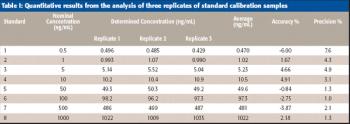
Assay sensitivity is the lowest concentration at which a targeted analyte can be measured and is often limited by chemical background or co-eluting interferences. FAIMS in combination with liquid chromatography (LC) and zero neutral loss tandem MS was used to remove chemical background and co-eluting interferences from the analysis of linoleic acid in cancer cell extracts. Concentration of endogenous linoleic acid was determined from back-calculation of standard calibration samples fortified with deuterium-labeled linoleic acid. No internal standard was used. LC–MS-MS analysis of the cancer cell extracts resulted in an increase in signal-to-noise ratio of 10-fold. The assay sensitivity was increased 10 times over the traditional LC–MS-MS experiment exclusively due to the new FAIMS technology.

